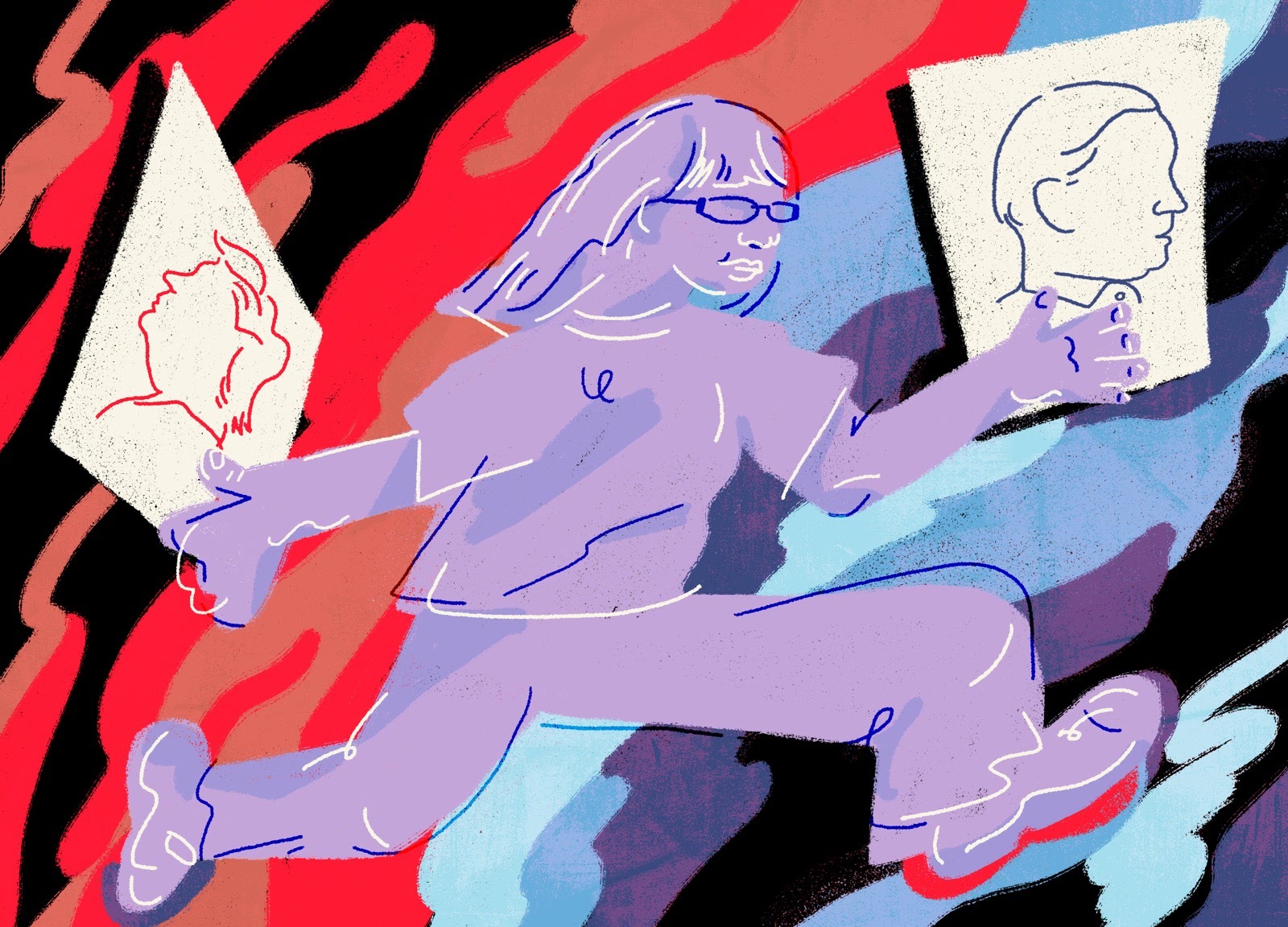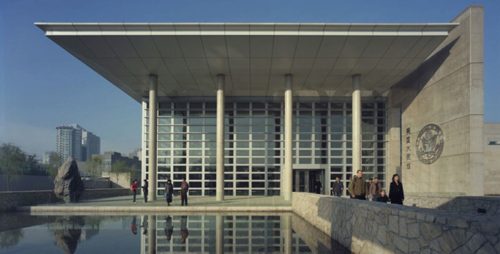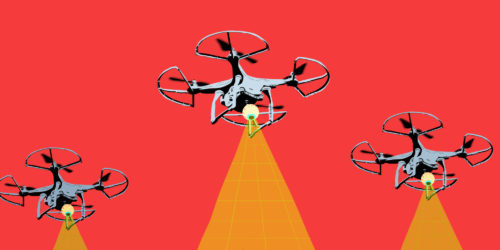Confessions of a Chinese-American Trump voter
“Growing up in an authoritarian system, I regarded cynicism as part of life,” writes Connie Mei Pickart, who became an American citizen six years ago and voted in her first presidential election in 2016. “But in a democratic state, a cynical attitude has far-reaching consequences,” she adds — a lesson she learned the hard way.

When Donald Trump got elected in 2016, it was a Wednesday afternoon in Shanghai. I was at school and had been following the numbers all day. Before our weekly staff meeting, I popped into a teacher’s classroom and said: President Trump. On the way to the meeting, I bumped into Kyunhee, my Korean colleague, who said to me: “I think the American people are stupid.”
I worked at an international school in Shanghai, where teachers from 20-some different countries taught students from just as many diverse backgrounds. The school is managed by the Shanghai municipal ministry of education, which has certain requirements on what schools can and cannot teach. Even for a non-Chinese student body, political topics like Taiwan or Tiananmen are off limits. But American politics, on the other hand, is safe to talk about, and a U.S presidential election usually generates great interest among students and faculty.
At the staff meeting, our head of school Mr. Tan was business as usual. At the end of his speech, he said, rather nonchalantly, “Looks like America has a new president, if you have been keeping up.” Not much response from the audience. When the crowd dispersed, I did not hear any comment about the election. I couldn’t decide what was going on: either my colleagues were apolitical, or they were so abhorred by the results that they didn’t want to talk about it — or that America’s primacy had already so declined in our little international cosmos that the election of its president no longer mattered.
But at least one person welcomed Trump’s victory. Aaron, my American colleague, was in good spirits when I walked into his classroom.
“Did you hear?” I said.
“Uh-huh,” he pursed his lips and nodded slowly, as if everything had happened as he expected. I could tell that he was containing his excitement, conscious of the Democratic majority among his colleagues. With me he was more relaxed, raising a celebratory fist before I left.
Melissa, another American teacher, was in tears when I walked past her room. “Is everything okay?” I stopped in and asked.
She sniffed her nose and wiped tears from her eyes. “I’m just really sad.”
“Is it the election?”
“Yeah…”
“You’re not a Trump supporter.”
“Nope.”
“What is it about him that you don’t support?”
I realized, after I spoke, that it wasn’t a good time to ask, but she answered anyway, with lots of emotion. “I’m just so sad that our country has put such a terrible human being in the office.”
“If it’s his moral standing…”
“It’s not just his moral standing!” she objected, not letting me finish.
I wished Melissa well before I slipped into another classroom. “Did you hear?”
“What? Donald Trump?” Grant turned his head slightly, his eyes never leaving his computer. “Idiot,” he finally said. Grant is British, and never has much to say about politicians in his own or other countries. And with the newly elected American president, “idiot” was all he had to offer.
Back in my office, I swiped my phone for new messages from a WeChat group. My Chinese friends and I had been talking. Most of them were still in the office at this hour, with no energy left for work but lots of excitement for the U.S. election. “Trump’s gonna win,” I had announced hours ago. “Come on, Ms. Connie, give us your analysis,” someone in the group cheered me on. My friends wondered why American voters had chosen Trump. “Because with Hillary, people know what they’re getting,” I said. “But Trump, on the other hand, is a wild card. He could be good or he could be bad. But the key is that there’s a chance he could be good.” My friends liked my assessment, which they interpreted as “high risk, high reward.” Then someone asked, “And who did you vote for?”
“Well,” I said, “as a first-time voter, I’m glad that my vote went to the winner, both in my state and nationally.”

I voted for the first time as a U.S. citizen in 2016, having naturalized just two years before. In 2013, I made a career discovery that drove me to pursue U.S. citizenship. While I worked an education job that wasn’t quite satisfying, I learned about the career pathway to the U.S. Foreign Service — any U.S. citizen can enter the selection process to become a Foreign Service Officer. I had followed international news since I was a teenager and had always been interested in foreign affairs. If it was an open selection, then why not try it, I thought. And if I were selected, I could help strengthen the ties between my home country and my adopted country.
I had to give up my aspirations of joining the Foreign Service when my husband and I decided to move back to China. I chose to stay in education and figured that I didn’t have to work in an embassy or consulate to do public diplomacy. I could promote understanding of China in Shanghai’s expat community and also help my Chinese friends learn more about America. In a way, I reasoned, I would be doing what a Foreign Service Officer does, by being a cultural ambassador.
When Donald Trump declared victory, I was thrilled only in the sense that the candidate I voted for won. I had doubts about him like everyone else, but I couldn’t convince myself to vote for Hillary Clinton. I didn’t think she was the right person to bring America in the direction I thought the country needed; Clinton represents the establishment — if elected, she would have most likely maintained the status quo. The way she treated Bernie Sanders also turned me off. I decided to give Trump a chance. So much was known and unknown about him at the same time; perhaps he could turn out to be an OK president. Perhaps he could be the outside force that Washington needed to bring systemic change. And not knowing much about foreign policy, perhaps he would entrust people with the experience and expertise to carry out America’s diplomatic mission. Perhaps he would be a good friend of China and bring Sino-U.S. relations to new heights. He is a businessman, after all; he would understand the concept of mutual benefits. While all this seems naive in retrospect, I wasn’t alone in my beliefs at the time.
I didn’t support all of Trump’s policies and wasn’t a fan, but I was viewed as a monster for my participation in the U.S. electoral process.
Nick, my Canadian colleague at the international school, rolled his eyes at me when he found out I voted for Trump. “How can you vote for a racist?”
“That’s what his opponents make him out to be, but there’s no outward evidence suggesting that he is,” I retorted, although I wasn’t fully certain myself.
My American colleague John sort of agreed with my sentiment. “If you listen to the older generation talk, they all sound pretty racist. And Trump is pretty old.” A native of Georgia, John is a staunch Democrat who jokingly suggested I move to his home state — “You’ll fit right in with your Republican views!” Both John and Nick compared Trump with his predecessor as they reminisced about the good old Obama years.
“But Obama didn’t do so well with China,” I said.
“What do you mean?”
“He’s the one who dissuaded countries from joining the AIIB, the Asian Infrastructure Investment Bank led by China. How do you think China would perceive that?”
“And you think Trump will do better? Didn’t he make a call to Taiwan’s president?”
“He did say he will honor the One China Policy after the phone call. Call it a learning curve, if you will.”
This wasn’t the only time I was attacked after revealing I voted for Trump. I certainly didn’t support all his policies and wasn’t a fan, but I was viewed as a monster for my participation in the U.S. electoral process. To deflect tension, I always turned to U.S-China relations, which I cared about most and hoped would improve after Obama’s ill-conceived China policy. And — naively, in hindsight — I thought Trump could bring that change. When he met with President Xi Jinping at Mar-a-Lago within his first 100 days, I thought things, indeed, seemed to be going well.

A lot can change in four years. For the world’s two major powers with diverging values and political systems, maybe conflict is to be expected. Graham Allison’s book, Destined for War: Can America and China Escape Thucydides’s Trap?, came out in May 2017, shortly after Trump took office. In his book, Allison pointed out how war can be avoided between established and rising powers, and yet so much rhetoric following the book’s publication revolved around the inevitability of major clashes between the U.S. and China. In this context, Trump announced sweeping tariffs on Chinese imports in March 2018, followed by retaliations from China, and the conflict soon escalated into a trade war. In October, Mike Pence delivered a speech in which he said the United States will prioritize competition over cooperation with China. The Thucydides’s trap seemed all but real. But even amid the tension, there were reasons to remain hopeful. Economic conflict isn’t unique to the U.S. and China; the players involved could eventually find a solution that is mutually beneficial. Some positive developments have indeed come out of the trade talks, and a Phase One deal, however imperfect, was signed in January 2020.
The same week I read about the signing of the trade deal, my husband and I were getting ready to leave Shanghai. We had booked our vacation in Hong Kong for the Chinese New Year, and with the intensifying reports of a novel coronavirus breaking out in Wuhan, we were prepared to extend our leave for much longer. In March, when school resumed — online — on the mainland, we found ourselves still stranded in Hong Kong.
During the day, while my husband taught online — he is also a teacher — from our hotel room, I went by Victoria Harbor with my phone and notebook, reading up on the news and trying to make sense of the chaos. By then China was in lockdown; images of Wuhan’s wet market, where the pandemic presumably originated, spread over international media. President Trump invoked the label “the Chinese virus,” and his staff got creative with names like “kung-flu.” On Twitter, I saw videos of people spraying disinfectant on Asians on New York’s subway. I saw Chinese Americans being shunned, ridiculed, and physically attacked. My heart sunk a little deeper with every tweet I read.
Living in China had provided me with a sobering distance for observing American politics. By then I had stopped following all the drama coming out of the White House. It was embarrassing to witness the erratic behavior of a president I had helped vote in; shutting him out was my way of denial. But seeing what the Asian community was going through, I began to feel ashamed about defending this president in front of my former colleagues.
Three years earlier, I had left my old school and dedicated my time to writing. Now, more than ever, I felt like getting back in touch. I pulled out my phone, typed a long message, and sent it to several former colleagues in a WeChat group. “I hope you’re all doing well in these trying times,” I said. The messages kept buzzing throughout my stay in Hong Kong and continued when my husband and I returned to Shanghai in mid-March. Two weeks after we returned, China closed its borders to foreign nationals, as the U.S. saw a spike in cases. I took to WeChat to see what my former colleagues were thinking.
“Every country is now finger-pointing. Just a few weeks ago, the discussion was about discrimination toward Chinese in the U.S.”
“I worry many countries and current leadership will politicize these issues after the pandemic.”
“Countries just don’t seem to want to work together even though this is a huge problem for everyone.”
Before the pandemic, my husband and I had planned to go back to the U.S. over the summer, but with the borders closed, we had to abandon that plan. “I’d probably get questioned by immigration,” I said. “They probably think I’m either a disease carrier or a spy, or both.” Earlier that month, China and the U.S. expelled each other’s journalists — something they continue to do. In June, Trump signed an executive order suspending H-1B work visas through the end of 2020, making it nearly impossible for non-immigrants, many of them Chinese, to stay in the country. Would immigrants be next? I wondered. The president I had voted for was becoming a threat to my own community.
I was willing to give an outsider a chance four years ago, knowing full well that he had serious faults. But I cannot watch the president continue to destroy the country.
Our WeChat discussion turned to the U.S. election: “If the U.S. comes out of this (pandemic) during this year, I foresee Trump being reelected.” Everyone weighed in on whether Joe Biden was the right person to beat Trump. “My strong sense is that only Joe can beat Trump,” said Bo, one of my former colleagues, during the Democratic primaries. “I applaud some of Bernie’s ideas, but in a general election he will lose.”
I was sad when Bernie dropped out. I admire him for what he did — twice — but the way the Democratic Party consolidates votes isn’t exactly inspiring. It is a symptom of a bigger structural problem, and solving it requires drastic measures. For that reason, I was willing to give an outsider a chance four years ago, knowing full well that he had serious faults. But I cannot watch the president continue to destroy the country, even if it means putting an establishment figure in office, just so that the bureaucracy can function again. Even before Joe Biden secured the Democratic nomination, I knew that I would vote for whomever that party chose.
In our WeChat conversations, Bo kept spelling Trump as “tRump.” I asked him why. “It’s a passive-aggressive way to share my feelings about him,” he said.
I laughed, and then shared my own assessment of the president. “Whatever states and the private sector do to fight the pandemic, Trump will take credit…Since he took office, Trump has disrupted American institutions on an unprecedented scale…Trump plays into the divisiveness of the country and is doing more harm and damage than any president before him…Trump is after one thing and one thing only: his own power.”
We couldn’t agree whether Trump’s deflection tactics by holding China responsible for the pandemic were effective, but we all agreed that we lived in an unfortunate if not dangerous time. “Not a good feeling,” Bo said. “Very hard on those of us who believe in the beauty of diversity and interdependence across humanity.”

In July, the United States ordered China to close its consulate in Houston, followed by China closing the U.S. consulate in Chengdu. Mike Pompeo gave a speech in which he declared that the era of engagement with the Chinese Communist Party is over. I imagined what was going through the foreign officers’ minds on the day the Chengdu consulate was closed. Were they sad to move on, knowing that decades of engagement with China were brought to a halt, as suggested by their boss? Were they frustrated that the work they had put in to build diplomat relations, both officially and unofficially, was diminished by hawks in Washington, and undermined by the president himself?
When Destined for War first came out, Arthur Waldron, a historian at the University of Pennsylvania, penned a critical review of Allison’s book, calling it “ill-conceived and sloppily executed.” He starts by dismantling the false premises that have given flesh to the Thucydides Trap narrative. “The whole Thucydides Trap does not exist,” he says, “even in its prime example.” He then criticizes Allison of being caught in the China fever, and by overestimating China’s army size and growth rate, of amplifying the tensions between the two countries rather than giving a recipe for peace. The problem, however, is not Allison. As Professor Waldron sees it, “the problem is the pervasive lack of knowledge of China — a country which is, after all, run by the Communist Party, the police, and the army, and thus difficult to get to know. This black hole of information has perversely created an overabundance of fantasies, some very pessimistic, some as absurdly bright as a foreigner on the payroll can make them.” With the consulate closure and the exit of U.S. journalists from China, contact is further diminished, and the black hole of information will only grow bigger.
As for my part, I can only consider my first vote as a lesson learned on democracy. There were many reasons why I voted for Trump, but underneath all those justifications was my cynicism. Growing up in an authoritarian system, I regarded cynicism as part of life, possessed by many and a necessary outlet for otherwise unchanneled grief. But in a democratic state, a cynical attitude has far-reaching consequences.

A lot has changed over the past four years. I look back at my time as an educator, which seems like a lifetime ago. Everything is a blur: the school auditorium, the classrooms, the people I have worked with. My former colleague Melissa has gone back to the U.S. She left teaching a few years ago and started a business. Grant recently left China, too, after fulfilling another teaching contract at a different school. He is now in Malaysia. Aaron, my fellow Trump voter, died shortly after the 2016 election. He had cancer and did not make it out of surgery. He was only 39.
But certain things do not change. Just last week, I saw a poster by Vote From Abroad, an organization that helps overseas U.S. citizens register to vote. Four years ago, I received their help for the first time at a restaurant and brewery in Shanghai’s former French concession. This year, they are offering their assistance again at the same venue. My husband and I plan on visiting them again, after we order our absentee ballots online — the process is essentially the same. It is the constancy of this process that gives us hope — and, when things go awry, the opportunity to right the wrong.
On the poster, the organizers remind people to wear a mask when they come to vote, but in most public places, masks are no longer mandatory. Shanghai has been back to normal for a while now. People are still cautious, especially on public transit, but gatherings have resumed and even encouraged, as night markets light up various parts of town over the weekend. It is one of the government measures to boost post-COVID consumption. As the international environment grows more hostile, China is looking inward at domestic demand to sustain the economy.
It is good news for someone like me, who has missed all the social events. As the school year begins, I decide to organize my own monthly gathering, a book club that I have wanted to start since before the pandemic. I call it The Sinophile Book Club, dedicated, as I tell people, to reading and learning about various facets of China. I figure, even if the leaders of the two countries have broken off engagement, we civilians must carry on. Call it a redemptive act, if you will.






